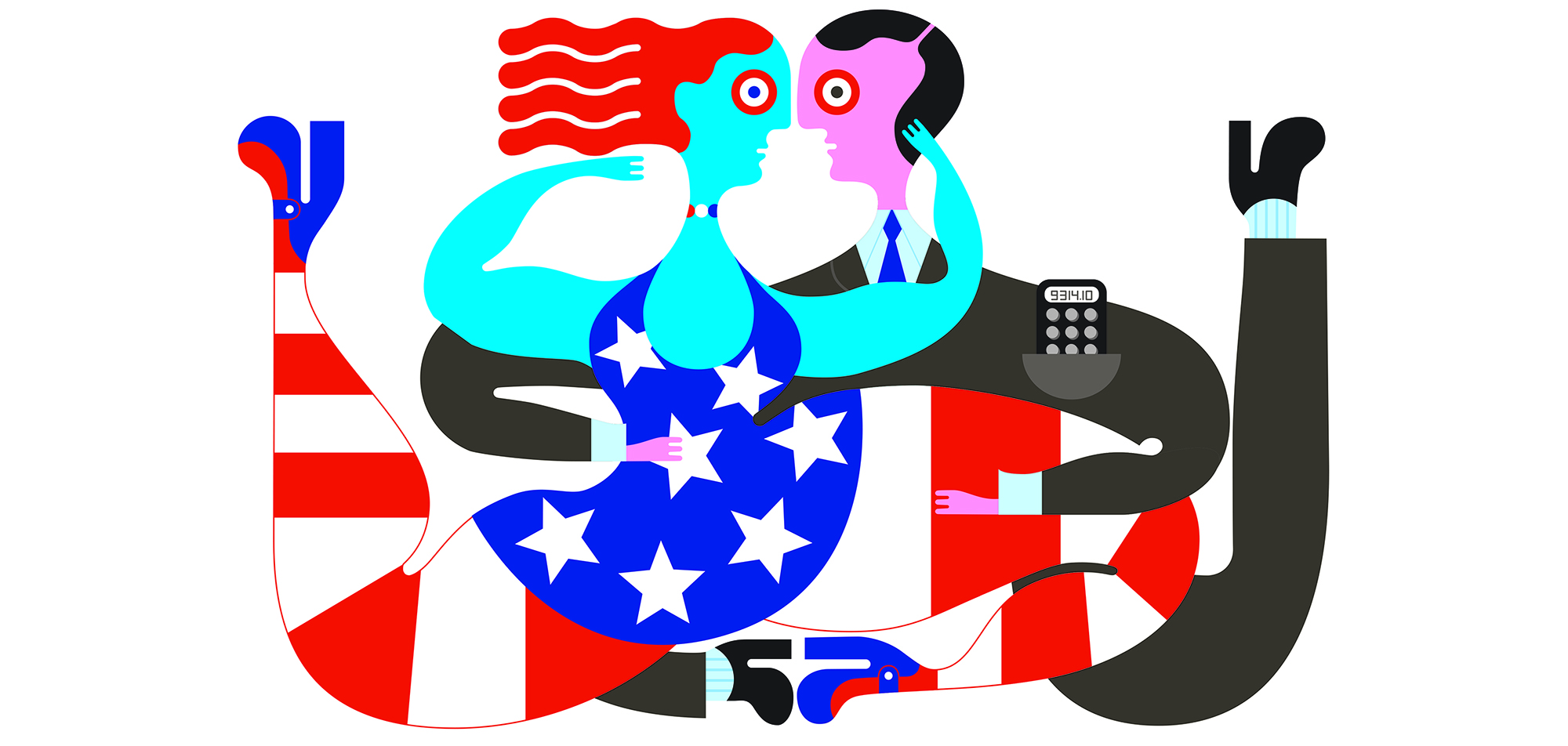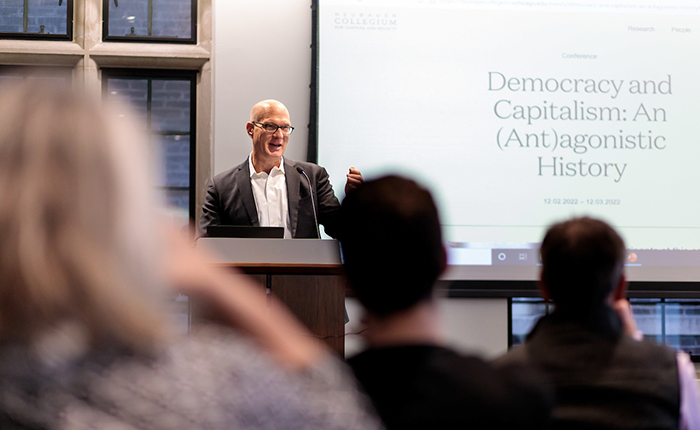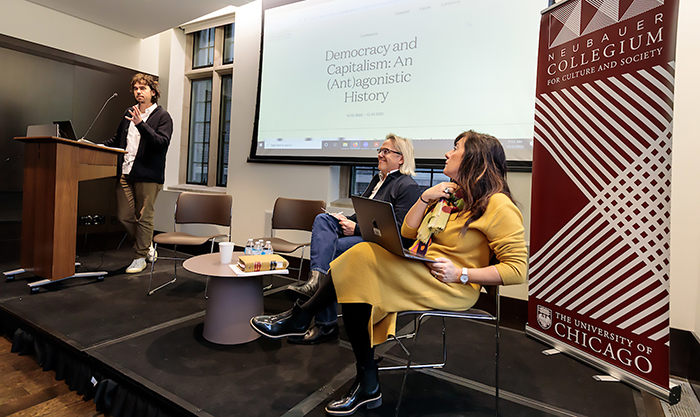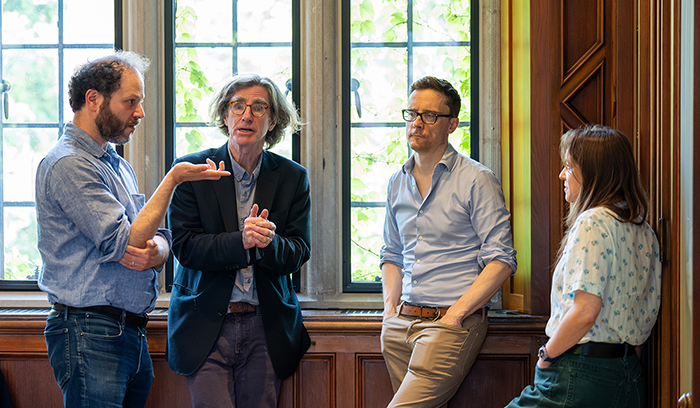
(Illustration by Melinda Beck/istock.com)
Two faculty projects examine the awkward partnership between democracy and capitalism.
Democracy and capitalism—popular rule in politics and an economic system based on private investment and markets—are a modern power couple. Coming of age together in the 18th and 19th centuries, both promised a form of society that is more self-regulating and less subject to top-down control. They were certainly more enlightened and egalitarian than their stodgy parents, monarchy and feudalism. And in the 20th century, the authoritarianism of communist states seemed to demonstrate the bond of Western democracy and capitalism by contrast.
Still, democracy and capitalism are awkward dance partners. Each wants to lead. They step on each other’s toes. They’re usually, but not always, seen together. Democracy flirts with socialism when it’s in the mood, and capitalism has been spotted in the corner with dictators.
This aging relationship, with its strengths and weaknesses, has been the subject of two recent faculty projects based at the Neubauer Collegium for Culture and Society. The first, called Democracy and Capitalism: An Interdisciplinary Project in History, Law, and Politics, took place in the 2022–23 academic year. The second, titled Economic Planning and Democratic Politics: History, Theory, and Practice—focused in part on whether public control of the economy can fuel a “green transition”—is an ongoing project that kicked off in July 2023. Both projects are interdisciplinary, bringing together historians analyzing the past with political scientists, economists, and legal theorists prescribing possible futures.
The underlying questions are fundamental: When can we rely on the invisible hand of the market to meet human needs? What policies and institutional innovations could help bend a country’s economic activity to the public good? What bedrock political and economic principles should guide us?

The first project’s inaugural conference, held at the Neubauer Collegium in December 2022, began by placing regulation at the center of the American founding. At the podium, addressing an intimate group of invited colleagues, University of Michigan law professor William Novak said the revolutionaries’ campaign to drive out the British had posed an urgent question: “How do we allow the state to create better conditions for the emergence of a domestic economy that can sustain itself without dependence on some kind of foreign or imperial entity?”
In response, Novak said, the colonists’ earliest attempts at popular self-governance—provincial congresses and revolutionary committees—created the rudiments of a regulatory state concerned with promoting public safety, encouraging manufacturing, and reining in prices, among other goals. This research cuts against the idea, which Novak said became “almost mythic” in the mid-20th century, that the American republic was founded by treating private property as sacrosanct and always in need of protection from government interference.
In a discussion later that day, Jonathan Levy, AM’03, PhD’08, one of the project’s faculty leads and the James Westfall Thompson Professor in the Department of History and the John U. Nef Committee on Social Thought, extracted a key point: “In this period, state power is at the cutting edge of creating markets.” In fact, as Levy outlines in his book Ages of American Capitalism: A History of the United States (Random House, 2021), the British imperial project from which the United States grew was an attempt to expand markets, for both capitalists and the Crown, through territorial conquest.
Historical work like Novak’s and Levy’s is a reminder that even so-called free markets are made possible by state power—which may or may not be democratic—just as they are both sustained and hemmed in by that same power.
This is not the economic thinking UChicago is known for. Prominent economists like Milton Friedman, AM’33, and George Stigler, PhD’38, advocated using markets to solve problems whenever possible, while pointing to the relative inefficiency and corruption of governments. By digging into the history—and possible legitimacy—of robust forms of public regulation, economic planning, and public ownership, the two Neubauer Collegium projects provide a modest counterweight on campus to the Chicago school tradition.
The policies associated with the Chicago school—deregulating industries, cutting or privatizing state programs, lowering taxes on individuals and corporations, and eliminating barriers to trade—can be described as promarket. They are also described, especially by their detractors, as neoliberal. This term is more often hurled as an insult than defined, but James Sparrow, an associate professor in the Department of History and also a faculty lead on Democracy and Capitalism, hazards a definition. Neoliberalism, he says, is an assault on the very idea of the public interest, an idea that was taken for granted by New Deal–era programs like social security and unemployment insurance. In its place, Sparrow says, we are given a “radically individualistic calculus of utility maximization,” that is, a way of viewing society as a set of competing, selfish units.
It’s a dog-eat-dog world in this view, and the best we can do is to make sure the dogs are free to fight it out openly and vigorously.
In a standard telling, neoliberalism ascended in the late 1970s and ’80s with the conservative administrations of Prime Minister Margaret Thatcher in the United Kingdom and President Ronald Reagan in the United States, becoming dominant globally through institutions such as the International Monetary Fund and the World Bank. It also got an early test-drive in Chile by a cadre of UChicago-trained economists who advised the military dictatorship of Augusto Pinochet after his 1973 coup against a democratically elected government—a dramatic example of free markets divorced from political freedom—as documented by Sebastian Edwards, AM’78, PhD’81, in The Chile Project: The Story of the Chicago Boys and the Downfall of Neoliberalism (Princeton University Press, 2023).
By the turn of the 21st century it was common sense across party lines to cut welfare spending, deregulate the financial sector, and promote free trade within North America, three policy goals advanced with significant legislation in the 1990s by Democratic US president Bill Clinton.
The two Neubauer Collegium projects are inspired less by the meteoric rise of promarket policies than by their apparent decline. Gary Herrigel, Paul Klapper Professor in the Department of Political Science and a faculty lead on Economic Planning and Democratic Politics, underscores a “movement towards circumvention of the market and a more active state” in recent years. It is as if the 2008 financial crisis and the COVID-19 pandemic reminded policymakers and the public that massive, coordinated interventions in the economy—new regulations, industry bailouts, direct stimulus payments, loan and grant programs, tax-funded public health measures, and more—are all tools at our disposal.
When is it a good idea to pick up these tools? And what new tools might help?

As part of Economic Planning and Democratic Politics, scholars explored some of the possibilities for renewed government action in the economy in a series of seven lectures from December 2023 to May 2024—on Zoom, at the Neubauer Collegium, or both.
In one lecture, economist Peter Boettke of George Mason University took an “Austrian school” perspective aligned with UChicago economics, drawing on the work of Friedrich Hayek (a member from 1950 to 1962 of what is now the John U. Nef Committee on Social Thought) by emphasizing the efficiency of markets, the inability of government planners to access enough information to make rational decisions, and the danger of concentrating power in a state bureaucracy. From there, the events took a left turn, covering approaches ranging from Keynesian (stabilizing the economy by tuning fiscal knobs like interest rates, tax rates, and the quantity of available money) to democratic socialist (creating a more equal society by redistributing wealth, guaranteeing universal services, and collectivizing ownership of parts of the economy).
No one seemed to argue for a Soviet-style system with a fully nationalized economy and no markets. In a Zoom talk titled “Is Socialism Feasible?” the answer to the titular question, flashed in large type on a blue slide by British economist Geoffrey Hodgson, was “only within a liberal order, with markets and an effective, independent legal system.” Wary of the brand of socialism associated with Stalin and Mao, Hodgson recommended a decentralized economy including small-scale collectivist structures like communes and worker-owned cooperatives that produce goods and compete in markets.
The talks reflected different attitudes about whether state intervention in the economy should really be viewed as democratic. As Boettke and Hodgson noted, state intervention seems undemocratic when the state is authoritarian, poorly managed, or corrupt. But it also seems democratic, in a sense, when the state promotes public demands that would otherwise go unrepresented in a profit-driven market system. Instead of waiting to see if private investors find it profitable to halt the destructive impacts of climate change, for instance, the state can put a finger on the scales to promote sustainability. Indeed, a common thread in several talks—with titles like “Keynes, Carbon, and Socialism,” “Participatory Democratic Eco-Socialist Planning,” and “The Price Is Wrong: Why the Market Will Never Solve the Climate Crisis”—was the possibility of transitioning to a greener economy by installing new levers of public control.
This kind of nuanced discussion featuring dialogue across fields and institutions is characteristic of the Neubauer Collegium. In addition to sponsoring faculty research projects on a wide variety of themes—currently including Roman law, Pan-Africanism, and the history of music theory—the Collegium brings visiting fellows to campus and invites public engagement through its exhibitions gallery, a site for collaborations between the visual arts and academic research.
“We have been proud to support many projects that probe the links between democracy and capitalism since the Collegium’s inception,” says Tara Zahra, the Roman Family Director of the Neubauer Collegium and Hanna Holborn Gray Professor in the Department of History. She adds that the topic “raises questions that cannot be resolved within the framework of a single discipline.”
The Collegium hosted several of these two projects’ events at its building at Woodlawn Avenue and 57th Street, including a conference this past May for Economic Planning and Democratic Politics. Over two days, invited participants gave talks in the first-floor meeting room, which has doors that open to a patio with tables and chairs overlooking the street; chatted in the lobby while gesturing with small plates of cheese and fruit; and spent an afternoon in an intensive roundtable discussion—it was a square assembled from four long tables, technically—in a wood-paneled meeting room upstairs.
Not everything went to plan. During the final panel of the first day, as Yale law professor Amy Kapczynski addressed an audience question about democracy, the sound of distant chanting became audible, then unmistakable, as protesters marching down 57th Street became harder to ignore. “Seems like democracy is happening right outside today,” quipped Cornell University historian and social theorist Aaron Benanav, AB’05, one of the project leads, acknowledging a more confrontational way of pressing political demands than the ones the conference participants had been mulling over in their sessions.

Political battles are tough, regardless of the tactics used. And determining the proper relationship between states and markets is messy territory, in theory as well as in practice. It’s tempting to think there’s an easy out. As inequality increases, one way to fill the gaps in public funding and keep social and environmental priorities in view is by turning to philanthropy.
So, maybe the rich will save us?
Chiara Cordelli, professor in the Department of Political Science and a faculty lead on Democracy and Capitalism, is skeptical. Of course we can be thankful when private funding underwrites important causes. However, as outlined in a book coedited by Cordelli, Philanthropy in Democratic Societies: History, Institutions, Values (University of Chicago Press, 2016), relying on donations from the wealthy means letting them set the agenda for our institutions while the public subsidizes the tax write-off.
In this way, Cordelli says, philanthropy is an example of the more general power of the wealthy “to invest in the future, to determine what gets produced, to determine the value of assets.” She says that even if US society were to achieve higher levels of regulation and redistribution—already a tall order—this tremendous power to determine the economic future would still lie with a relatively small class of wealthy investors.
Uneasy with this structural feature of capitalism, some involved in the two Neubauer Collegium projects want to see the state get in the game of production and investment instead of just playing referee. At the May 2024 conference, for instance, Melanie Brusseler of the UK-based think tank Common Wealth argued for the nationalization of electricity production, claiming that private investment can’t provide the kind of coordinated, risk-tolerant response to climate change that could be mustered by a public program. And Cornell law professor Saule Omarova, a former adviser to the US Treasury Department, argued for the creation of a national investment authority to advance long-term national priorities.
Unlike its aloof siblings the Federal Reserve and the Treasury Department, Omarova says, the national investment authority would get its hands dirty as a lender and guarantor in credit markets and as an asset manager and venture capitalist in equity markets. It could direct flows of private investment to critical infrastructure and clean technologies, use its power as a stockholder to improve labor conditions, and create a competitive public option for institutional investors such as pension funds, among other positive social functions.
“Do you feel lucky, punk?” Omarova asked, ventriloquizing the agency she was proposing. “Make my day. I’m the 800-pound gorilla. Not Black Rock. Not JP Morgan. Not even Goldman Sachs. It’s me, because I am the one who has the entire force of the federal government, the full faith and credit of the United States.”
Herrigel says Omarova’s proposal raises a key question for the ongoing Collegium project: “How might such alternatives to the market be made to be sustainably democratic?” If the state is going to direct investment, for example, how do we ensure these actions reflect the public will? “That is the challenge we will be devoting ourselves to in the next two years.”
